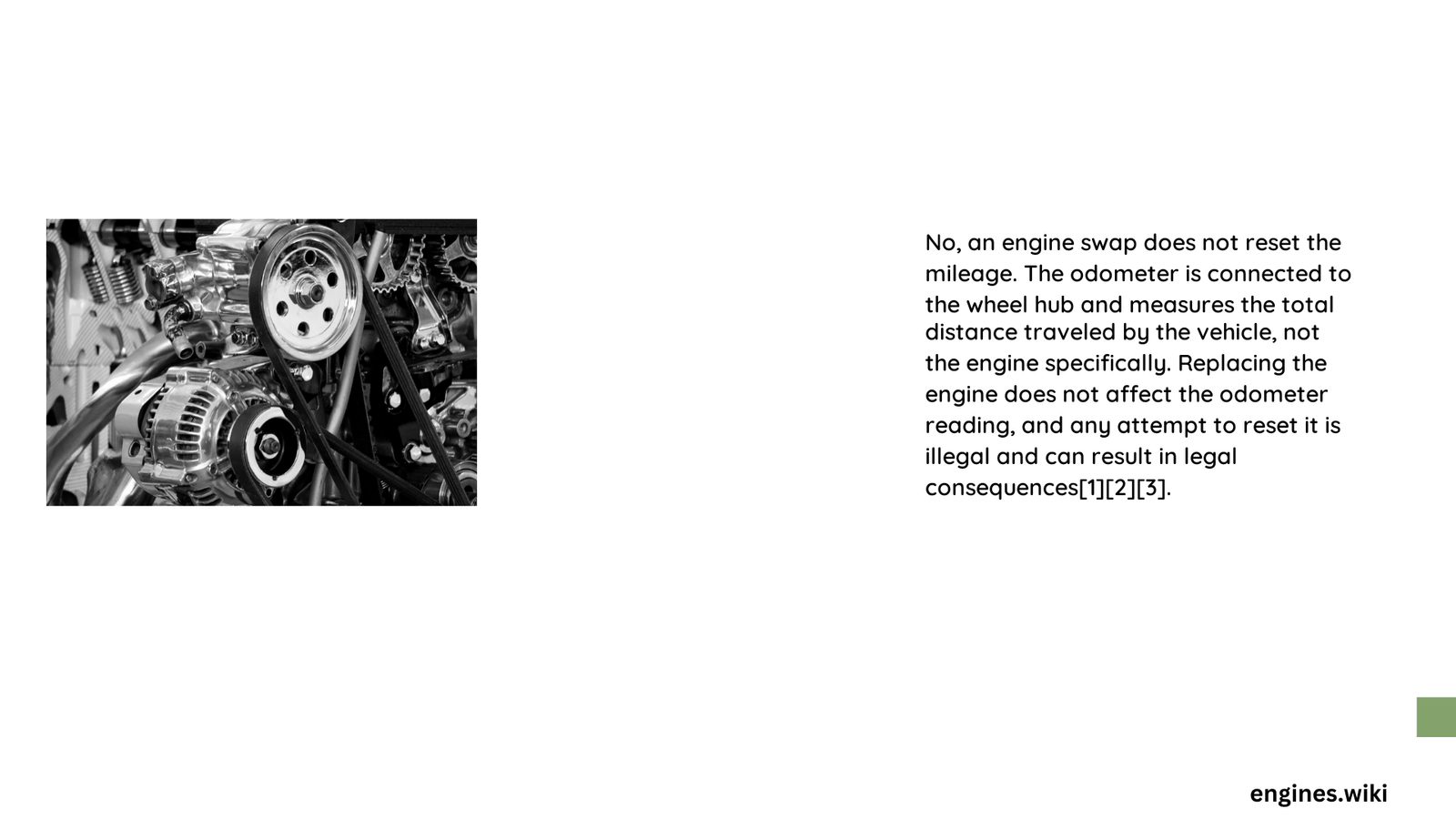An engine swap does not automatically reset a vehicle’s mileage. Vehicle owners often wonder about the impact of replacing an engine on their car’s recorded distance. The odometer tracks wheel rotations, independent of the engine type, ensuring that mileage remains consistent even after a complete engine replacement. Federal regulations strictly prohibit intentional odometer manipulation, making any deliberate mileage reset illegal and potentially subject to significant penalties.\n\n## What Determines Mileage Tracking in Vehicle Engines?\n\nMileage tracking is a complex process involving multiple automotive systems. The primary mechanism for recording distance traveled relies on wheel rotation sensors, not the engine itself. Here’s a detailed breakdown of how mileage is calculated:\n\n### How Do Wheel Rotations Influence Mileage Calculation?\n\n- Sensor Mechanism: Wheel speed sensors detect each rotation\n- Circumference Calculation: Tire size determines distance per rotation\n- Electronic Recording: Modern vehicles use digital odometers\n\n| Component | Mileage Impact | Tracking Method |\n|———–|—————-|—————-|\n| Engine | No Direct Impact | Independent |\n| Wheel Sensors | Primary Tracking | Rotation Count |\n| ECU | Data Storage | Electronic Log |\n\n### What Legal Restrictions Exist for Odometer Manipulation?\n\nFederal law 49 U.S.C. 32703 provides strict guidelines regarding odometer modifications:\n\n1. Prohibits intentional odometer disconnection\n2. Prevents deliberate mileage alteration\n3. Imposes significant legal penalties\n4. Requires transparent disclosure during vehicle sales\n\n## Can Engine Replacement Affect Vehicle Documentation?\n\nWhile an engine swap doesn’t reset mileage, it requires careful documentation:\n\n- Maintenance Records: Detailed engine replacement logs\n- Vehicle Title: No mileage modification\n- Insurance Documentation: Transparent reporting\n\n### What Technical Considerations Exist During Engine Swap?\n\nProfessional mechanics follow specific protocols during engine replacements:\n\n- Preserve original electronic mileage records\n- Maintain continuous odometer tracking\n- Ensure compatibility with vehicle’s electronic systems\n- Verify sensor and recording mechanisms\n\n## How Do Modern Vehicles Track Mileage?\n\nContemporary automotive technology employs sophisticated tracking methods:\n\n- Digital Odometers: Electronically stored mileage\n- Multiple Backup Systems: Redundant tracking mechanisms\n- Integrated Vehicle Computers: Comprehensive mileage logging\n\n### What Happens If Odometer Malfunctions?\n\nIn rare malfunction scenarios:\n\n1. Professional diagnostic assessment\n2. Certified replacement of odometer components\n3. Mandatory documentation of mileage adjustment\n4. Legal disclosure requirements\n\n## Expert Recommendations for Engine Swap Procedures\n\nTo maintain vehicle integrity during engine replacement:\n\n- Consult certified automotive professionals\n- Maintain comprehensive maintenance records\n- Understand legal mileage tracking regulations\n- Use authorized service centers\n\n### Final Technical Insights\n\nAn engine swap represents a significant mechanical intervention but does not inherently alter a vehicle’s mileage tracking. Vehicle owners should prioritize transparent documentation and adhere to regulatory guidelines throughout the process.\n\nReference:\n- National Highway Traffic Safety Administration\n- Federal Motor Vehicle Safety Standards\n- Automotive Maintenance Regulations

